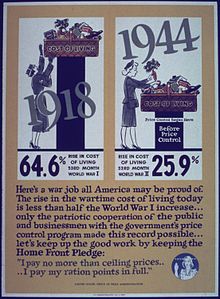Price controls
In economics, price control is the idea that the government fixes the prices that can be charged for a given product or service, in a given market. The government either fixes an absolute price that is charged, or a price range, with a minimum and a maxium. Usually this is done so that goods such as staple food remain affordable. It can also be done to avoid people charging way too much for a good or service, which is known as price gouging. Another field where it is done is to ensure a minimum wage or salary that employers must pay.

The problem with the approach is that according to the Law of Supply and Demand, the price of a good or service depends on its supply compared with the demand for it. If the price is fixed below the price the market would normally ask, the demand will increase - the product is "cheaper" than it should be. In general, the supply is fixed- at some point it is not possible to increase the production, and the supply. In the long term, it will therefore not be possible to meet the demand, and there will be a shortage.[1]
In the 4th century BC, Lactantius wrote that Diocletian "by various taxes he had made all things exceedingly expensive, attempted by a law to limit their prices. Then much blood [of merchants] was shed for trifles, men were afraid to offer anything for sale, and the scarcity became more excessive and grievous than ever. Until, in the end, the [price limit] law, after having proved destructive to many people, was from mere necessity abolished."[2] As with Diocletian's Edict on Maximum Prices, shortages lead to black markets where prices for the same good exceed those of an uncontrolled market.[1] Furthermore, once controls are removed, prices will immediately increase, which can temporarily shock the economic system.[1]
The Arab oil embargo between October 19, 1973 and March 17, 1974 is another example on how price controls cause shortages: Long lines of cars and trucks quickly appeared at retail gas stations in the U.S. and some stations closed because of a shortage of fuel at the low price set by the U.S. Cost of Living Council. The fixed price was below what the market would otherwise pay and, as a result, the inventory disappeared. It made no difference whether prices were voluntarily or involuntarily posted below the market clearing price. Scarcity resulted in either case. Price controls fail to achieve their proximate aim, which is to reduce prices paid by retail consumers, but such controls do manage to reduce supply.[3][4] When price controls on gasoline were lifted, the shortage ended and the long lines of cars at gas pumps disappeared.
Nobel prize winner Milton Friedman said "We economists don't know much, but we do know how to create a shortage. If you want to create a shortage of tomatoes, for example, just pass a law that retailers can't sell tomatoes for more than two cents per pound. Instantly you'll have a tomato shortage. It's the same with oil or gas."[5]
References
change- ↑ 1.0 1.1 1.2 Walter J. Wessels, Economics (2000), p. 232-33.
- ↑ Lucius Caecilius Firmianus Lactantius (c. 300). "VII.". On the Deaths of the Persecutors (Christian Classics Ethereal Library ed.). Calvin College.
- ↑ Taylor and Van Doren, pages 26-28
- ↑ Thomas Sowell, Applied Economics: Thinking Beyond Stage One (2008), pages 7-9, 112-113, ISBN 0-465-00345-1
- ↑ "Controls blamed for U.S. energy woes", Los Angeles Times, February 13, 1977, Milton Friedman press conference in Los Angeles.